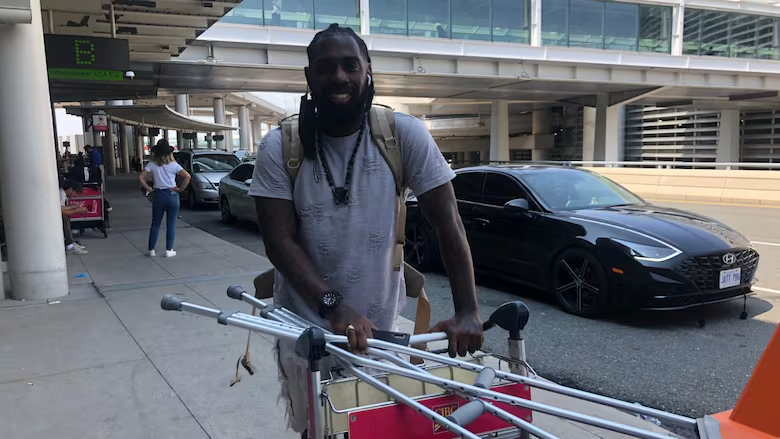Canadians reunite with American family after long absence as border restrictions finally loosen
Canadians still barred from non-essential crossings into the U.S., but vaccinated U.S. residents can visit

As travel restrictions loosen for U.S. residents, this week marks the start of a wave of reunions for Hamilton residents with family across the border.
As of Monday, U.S. citizens and permanent residents who are fully vaccinated are able to cross land borders for non-essential travel such as tourism and no longer need to quarantine, according to the Canadian government. The easing of the restrictions prompted many to arrive by land and air to make visits in cities across Canada, including Hamilton and surrounding areas.
Ronald Byrd of Atlanta, Ga., told the CBC, as he arrived at Toronto's Pearson International Airport Monday, that he was getting in an Uber to see his pregnant girlfriend in Hamilton. They've been apart since February.
"It's been crazy. It's been really hard," he said. "Every month we've been checking to see when the border will be opening."

He said that finding out he could visit without needing to quarantine was "one of the most amazing moments of my life."
"For the last two weeks we've been planning it, and now it's finally here," he said. "I'm going to grab her belly and kiss my son. It's the first time."
Border crossings have cost one couple around $8,000
For some couples, it's the beginning of the end of a long saga of expensive and time-consuming border crossings.
Coley Park first met her wife, Rachel Spaccarotelli, online at the end of 2019. She lived in Hamilton while Rachel lived in Buffalo, New York. Their entire relationship, including their marriage in August 2020, has taken place during the pandemic.
In March 2020, they were both in Hamilton when the lockdown began and the U.S.-Canada border closed. Spaccarotelli decided to stay in Canada and work remotely, although that would mean that she would be separated from the rest of her family for several months.

They've since had to navigate border crossings four times with Park's daughter in tow, they said. The travel cost them around $8,000, mostly for hotel stays and airline tickets to fly to Flint, Mich., instead of crossing directly to Buffalo.
Communication from border agencies has been inconsistent, they said. They described instances where they called Immigration Canada to confirm that they only needed to present a marriage licence application to border agents, only to learn at the border that they needed different documents, such as a tenant agreement that proved that they lived together.
When it comes to navigating travel, "you have to be able to really push back and argue," said Spaccarotelli, adding that the couple's resources and ability to navigate the system are privileges that others may not have.
"There's a lot of people that probably could have crossed, had they been able to comprehend the guidelines and advocate for themselves, but it's clear as mud on both sides."
Tuesday, CBC News reported that some Canadian travellers have received dozens of calls and emails from the Canadian government asking them to verify that they're self isolating, even though fully vaccinated Canadians and permanent residents have been allowed to skip quarantine when returning home from abroad for more than a month.
Fully vaccinated travellers can ignore automated messages from ArriveCAN, said Anne Génier, a media relations adviser at Health Canada and the Public Health Agency of Canada (PHAC), in a statement.
The Canada Border Services Agency and PHAC are working to address the issue, Génier said.
Despite their own travel hiccups, Park and Spaccarotelli were able to get married in Canada and build a life together, Park said. She added she hopes the re-opening of the border will mean that Spaccarotelli's American relatives can visit the couple in Canada.
"Now her niece and nephew that haven't seen their aunt, with the exception of a couple times in a year, are going to be able to come, and so will her sister, and her parents," Park said. "When you get married, it's something you really want to share with the people that you love."
Vaccine passport system would help, some families say
Other families have been separated for the entire pandemic. Joshua Turner, a steelworker who lives in St. Catharines, used to see his family in the United States about once a month. Now, he hasn't seen his parents or siblings for "more than 500 days," he says.
His parents and sister are in Syracuse, New York, while his brother, Christian, is in North Carolina.
"I made a point of trying to call my parents and my sister everyday or every other day, early on, because it was an absolutely frightening time," he said. "My parents are in their mid-70s and I was scared for them."

He's still not quite sure when they can gather together. While Canada is allowing fully vaccinated U.S. residents to visit without quarantining, Canadians are still not permitted to enter the U.S. via the land border for travel that is not considered essential.
Turner is worried that the restrictions would mean that his parents would not be able to get back into the U.S. if they visited him. He's been saving up his vacation days for a family gathering whenever that is possible.
"We're in a holding pattern," he said.
From the U.S. and Canadian governments, he would like to see a sort of vaccine passport system to simplify the process, he said.
"It's very frustrating that we can't take actions if we're responsible individuals who are fully vaccinated. Give me a vaccine passport," he said. "Give us people who are fully vaccinated some liberty."
With files from Yasmine Ghania and Laura Howells